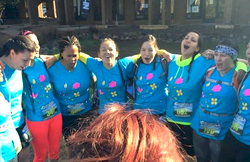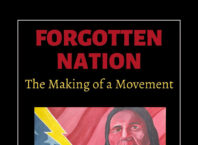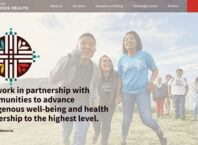 A collective of Anishinaabe women in northern Minnesota found strength
A collective of Anishinaabe women in northern Minnesota found strength
with one another. Their journey to health and wellness brought them
together gradually and almost synchronously since 2012. It all began
with some inspiration.
After completing a half marathon in 2011,
Chally Topping-Thompson (Red Cliff Ojibwe) encouraged her friend,
Sarah Agaton Howes (Fond du Lac Ojibwe) to finish a 5K run. This was
the birth of the movement now known as the “Kwe Pack,” a women’s
running society. In the Ojibwe language, “Kwe” can be translated
to “Woman,” but a deeper linguist investigation into this word
reveal a description of a sacred, life giving being. In Ojibwe
culture, women are considered precious pieces of the nation.
The Kwe Pack evolved to a group of
mothers, professionals, wives and students all currently committed to
running together along the woodland trails on the Fond du Lac
reservation. Topping-Thompson is currently the Indian Child Welfare
Director at the Red Cliff Chippewa Tribal Offices and Agaton Howes is
the House of Howes artist, teacher and Inspired Natives Collaborator.
The group started gaining momentum
when they decided to participate in The Superior Hiking Trail 25K
with a group of seven Indigenous women in 2013. The following year,
16 completed the Superior Hiking Trail 25K and 22 finished just this
spring.
As one of the original Kwe Pack
runners, Agaton Howes said she was honored to be a part of this event
as she saw the numbers of Indigenous women participating in the 25K
increased every year. “10 percent of the entire Superior Hiking
Trail 25K this year was Indigenous. It feels so amazing to see our
people over-represented in something healthy,” she said.
Alicia
Cyr (Grand Portage Ojibwe), a 27 year-old mother and Administrative
Assistant at the College of Saint Scholastica in Duluth, began
running with the Kwe Pack in 2013, shortly after the devastating loss
of her grandmother. She reflects on how meaningful being part of the
Kwe Pack is to her, “These ladies are amazingly tenacious. It’s
hard to describe fully what my heart feels for this group of
life-giving women.” She had been struggling to find a sense of
balance after her grandmother passed away, but found the Kwe Pack to
be a supportive, safe space to share similar struggles with other
Indigenous women, “I hear my grandmother in the Kwe Pack’s
laughter out on those trails, we offer each other courage and
wisdom.”
Each of the women are affected in some way by the
health disparities that are so prominent in Native communities;
diabetes or substance abuse, for example.
Annette Renquist (Fond du Lac) joined
the Kwe Pack after the birth of her son. She had watched her family
members suffer as diabetes gripped their bodies. “I signed up for a
half marathon at first by myself because wanted to help my family be
healthy.” Agaton Howes strongly believes that contemporary
lifestyles, which involve being extremely sedentary, is killing
Native people, “Our bodies were created for movement. Our inactive
lifestyles bring about new diseases of epidemic proportions. They are
the new smallpox.”
Embracing a healthy lifestyle as Native
people has become an urgent matter for the Kwe Pack. They have taken
the initiative to reclaim not only Indigenous wellness, but
exercising tribal sovereignty as well. They utilize their tribal
homelands by running in the wooded trails. Agaton Howes describes her
experience as she runs with her Kwe Pack sisters in the woods, “I
feel connected to our ancestors. I feel them when we’re out there
on those trails; the same trails they hunted, gathered, traveled,
portaged and lived in.”
As mothers, professionals and keepers
of the culture, the ladies have found solace in the company of one
another. Topping-Thompson shares how influential the other women have
been to her, “We have a feeling of belonging to something bigger
than ourselves. We are in a safe and very positive place.” She
continued, “We carry our Indigenous identity proudly. It’s
refreshing to be a part of a group where other Native women actually
build one another up!”
The Pack also rely on one another as a
resource by carpooling or sharing childcare providers, it’s how they
come together to help one another in all aspects of their lives.
Renquist started running about five years ago on her own and
recalls her experience, “It was awesome to finish a half marathon,
but I felt something was missing. That’s when I started running
with the Kwe Pack.” She also went through difficult times in her
life that could have taken her into depression, but she credits the
Kwe Pack for the support and encouragement to continue to thrive. “We
understand each other. I can share my challenges with them and they
are there to help heal my life,” she said.
The Kwe Pack
collectively hopes their actions will inspire other Indigenous women
across the continent to take the first step on their journey to
wellness. Cyr offers some insight, “Have a fearless heart. I
encourage all women to join or create a group like this. It has the
amazing ability to transform hearts and communities.”
- Poem
- by Chally Topping-Thompson
All
lovely 254 lbs of her pounded the earth to begin her life as a
runner. She felt out of breath, she felt fat, she felt dumb. All
those feelings she knew she didn’t want to carry anymore. Left in
the ditches and dirt of those Rez roads. Somewhere she knew she had
to. For her children she was yet to meet, for those who are waiting
for her. And with every bit of hope to inspire another, to make
healthy her normal, because all that, even the 254 lbs, it was her.
All for love and life.







